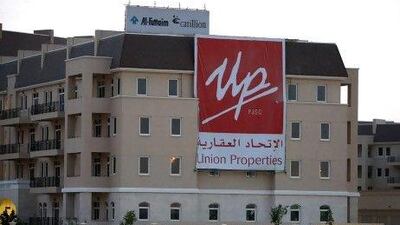Union Properties reported a record Dh1 billion (US$272.2 million) loss for the third quarter as the Dubai developer continued to write down the value of its property portfolio in the emirate.
Location, location, location:
Industry Insights What's hot and what's not in the world of property. Learn More
The builder behind the Green Community and MotorCity said revenue for the third quarter rose 75 per cent to Dh955 million, up from Dh545m from the same period a year ago, as it continued to hand over units in the Index Tower and Limestone House, its projects in the Dubai International Financial Centre.
But the company cut the listed value of its development property by a total of Dh1.1bn in the quarter, citing the market conditions. In total, the company devalued its property by Dh1.7bn in the first nine months of the year.
The write-down "reflects a cautious management approach over the group's asset portfolio, particularly in providing against all known contingencies and any anticipated impairment of real-estate assets", the company said.
Union Properties said it was in the "final stages" of rescheduling Dh1.4bn of loans due in the next 12 months. The company needs to repay Dh1.7bn of its existing Dh6.1bn of financial commitments in the next 12 months.
During the third quarter, the company applied its statutory reserve of Dh1.4bn to partially offset losses of Dh1.6bn accumulated as of June 30, according to its financial report.
A "significant shareholder", a bank, has agreed to provide funding for Union Properties to complete projects under way, the company reported.
It did not name the bank, but Emirates Bank Group is a major shareholder.
Union Properties has been particularly hard hit by the slowdown in the Dubai property market, where residential property prices have fallen by more than half since the peak of the market in 2008.
In recent months "it hasn't been all that bad", said Richard Paul, the head of valuations for the property firm Cluttons. "All the sectors have been at the bottom of the trough for some time now."
Union Properties' decision to write down the value of its portfolio may reflect that "different companies are feeling the effects at different times", Mr Paul said. "And different companies are going public with the effect at different times."
Union Properties' revenue for the first nine months of the year rose to Dh3.2m, compared with Dh2.1bn from the same period a year ago. Operating profit for the period rose 122 per cent to Dh264m for the nine months, compared with Dh119m a year earlier, and net margins for the nine-month period rose 8 per cent from 6 per cent.
But the company reported a net loss of Dh1.5bn for the nine months, due to the provisions for the value of its property. Last year the company reported a Dh751m loss for the first nine months.
The company also said it had reduced its bank debt by Dh741m in the past year, from Dh6.5bn at the end of the third quarter of last year to Dh5.8bn.
But it is still unclear how the "extreme instability" in the global financial market will affect Dubai pricing, the company said. There are "few transactions taking place in the market", it added.
Writing down the value of the property was a "prudent approach … premised on the basis of the current real-estate market, which as it stabilises in the near term will provide a platform for the company to progress without further hindrance," the company said.
twitter: Follow and share our breaking business news. Follow us

